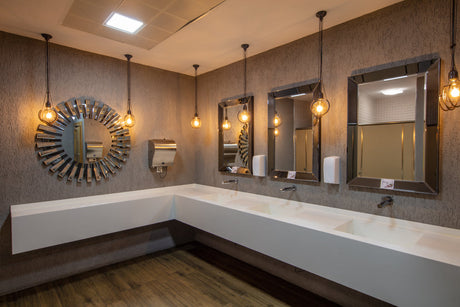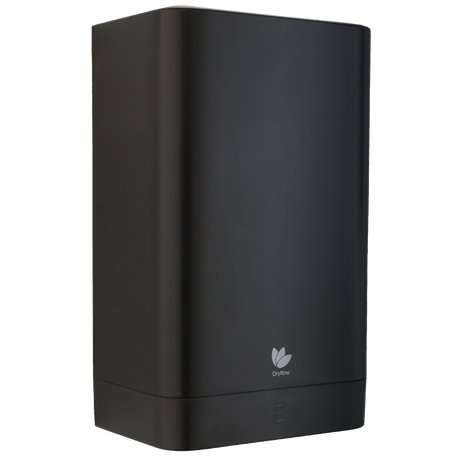


As we approach our ten-year anniversary on the 21st of November, Intelligent Facility Solutions’ founder, Andrew Cameron, reflects on some of the discoveries he’s made since launching our sustainable washroom solutions company back in 2021.

Ten things I have learnt over the last decade.
What started in 2012 as a desire to help companies reduce waste and become more energy efficient, has resulted in a phenomenal journey that’s seen my little company grow to more than 14 people, achieve £5 million turnover, move to stunning new riverside offices in Sheffield, complete with our own warehouse, and become the go-to supplier of hand dryers and washroom accessories for hundreds of electricians, building managers and designers alike.
Here’s what I’ve learnt along the way:
You can’t be too proud and need to be resilient.
When I started the business, my confidence was at a low point. The previous business I had built with four business partners had been laden with internal conflict and ultimately failed badly, I felt ashamed of it. I had also recently lost both my parents and had twins on the way, so the pressure was high.
Out of necessity, I did whatever it took to generate business. I remember walking up and down London Road in Sheffield, in the pouring rain, trying to rent air fresheners to restaurants. I got a few takers that brought me about £20 a month and sold a few hand dryers which got me off the ground, but I felt completely detached from my successful friends with solid, well-paid careers. I don’t know what would have happened if everyone had said no that day, I felt a little broken. Luckily a couple of businesses helped me out, giving me just enough to re-invest and start moving things along.
Small steps lead to big things.
Meanwhile, I was working on my website, trying to make it more usable than any of the competitors. I still remember the immense buzz I felt when my first online order came in! The realisation that I could actually make a living and my business had some potential spurred me on. From that day on, I mainly looked forward and the orders began to flow more regularly.

Consistency is key.
Consistency isn’t in my nature. I generally have lots of ideas and get frustrated when I fail to give each one the attention it deserves. This will resonate with many entrepreneurs, I am sure. I maintain that I invented the Moonpig concept in the 90s when I sent a business plan to an idea hub advertised on TV. They never wrote back and a few years later Moonpig had become a household name.
There are countless other examples of good and bad ideas I’ve had over the years that I didn’t move forward with. Intelligent Facility Solutions was different, seeing us take one simple idea and improving the business every day. OK, we are not massive, but we are a solid and respected company that can take a lot of pride from what we do in the community, for the planet and for our people. That would never have happened if I had carried on jumping from idea to idea.
You’re only as good as the people around you.
Skills are really important, but a willingness to muck in and turn your hand to different things is essential in a start-up. It needs energy, loyalty and people that buy into what you stand for. A good mindset and willingness to learn will trump academic achievement. Intelligent was built on people prepared to go above and beyond, and many of those people will take ownership of the company as a reward over the next few years.
My late mother had always said ‘do as you would be done by’. It’s so important to take a minute to check in with people’s well-being and I like to think we’ve helped a few people with their mental health over the years.

Making money is nice, but it must be secondary to doing the right thing for people and the planet. Don’t get me wrong, I want to win, particularly against competitors who I know are not as ethical as we are. I’d rather have just £1 in our pocket doing good than it going to a competitor who is less driven by social and environmental causes. I love the good that business can do.
Founders are good at getting things off the ground, but it’s essential that they trust others to take the business to the next level.
When I wanted to grow my business, I made a decision to empower others and bring experienced talent in. I remain the ‘conscience’ and help to underpin the business with a sense of social and environmental responsibility, however, I accept that others can help the business improve commercially much more than I can. It’s a very personal decision, but letting go can be very rewarding and improve your life and that of your team.
“The Intelligent team becoming owners over the next few years will give us all long-term security. Too many businesses operate purely in the interests of the owner and make that one person very rich. Not only is that against my principles, I actually believe it’s not in the best interest of a business and its people.
Misinformation is growing.
It really is very difficult to trust anything you read online. Even major newspapers and academic institutions are guilty of lazy journalism, taking information from elsewhere and not looking beyond the headline, but now it’s more subtle and quicker to get into people’s consciousness through social and online media.

And industries are abusing misinformation (to the detriment of the environment).
Sadly, some industries and corporations have used this poor approach to journalism to influence decision-making in favour of their products. Examples include the tobacco industry, fossil fuels, and the paper towel industry, which has, in recent years spent huge sums trying to discredit electric hand dryers and increase sales of paper towels.
This is based on flawed, PR-driven scientific studies that are designed to scare people into believing hand dryers are unhygienic. The reality is that these experiments never replicate ‘real scenarios’, and are now being discredited by organisations such as the World Health Organisation and Centers for Disease Control and Prevention. The sad thing is, it’s the planet that suffers as cutting down trees to make single use paper towels is anything but sustainable, since paper towels generate 10-20 times more carbon emissions than modern hand dryers.
Greenwashing is a problem.
The term greenwashing was coined by environmentalist Jay Westerveld in 1986, but in the past few years, it’s a term we’ve all become familiar with. Too many businesses are claiming that their products help the environment, but they are actually doing more harm than good.
But many companies ARE doing right by the planet.
We’ve all heard about Patagonia’s founder giving away his company to fight climate change, but there are tons of other companies out there quietly fighting the good fight. The 1% For The Planet Movement, which enables companies to make genuine contributions to environmentally-sound causes through donations of time and money, now has 5,000 members globally. Check them out. https://onepercentfortheplanet.org/

Hand dryers are more in demand than ever before.
The Paper industry did its best to drive anxieties, but our industry is finally enjoying the limelight it deserves. Hand dryer firms are focusing their energy, investment and brainpower on innovation across technology, applications and designs, providing energy efficiency, cost savings and optimal hygienic solutions at a fierce rate.
I can’t tell what the next 10 years are going to bring, I’m not even going to try to predict it…





